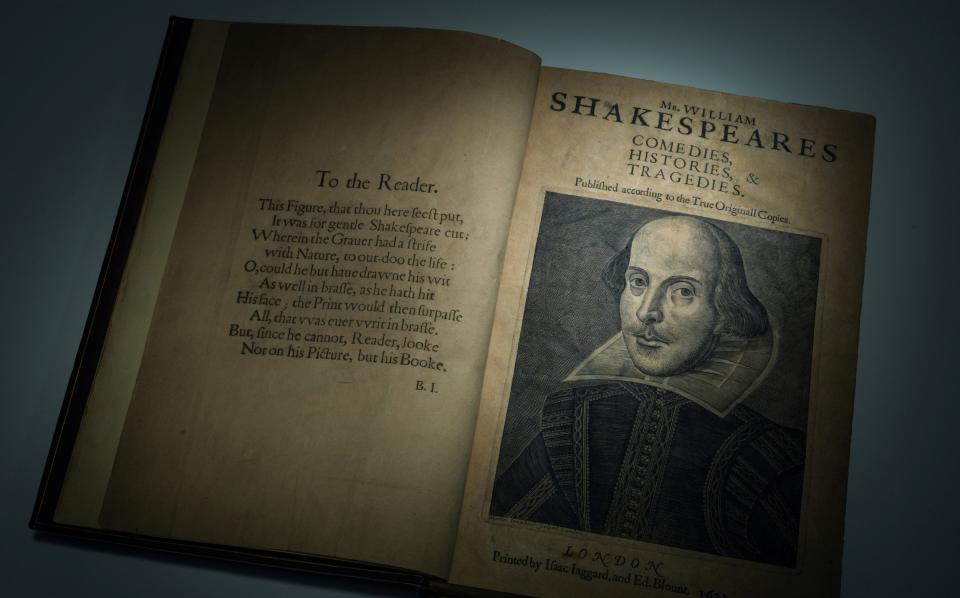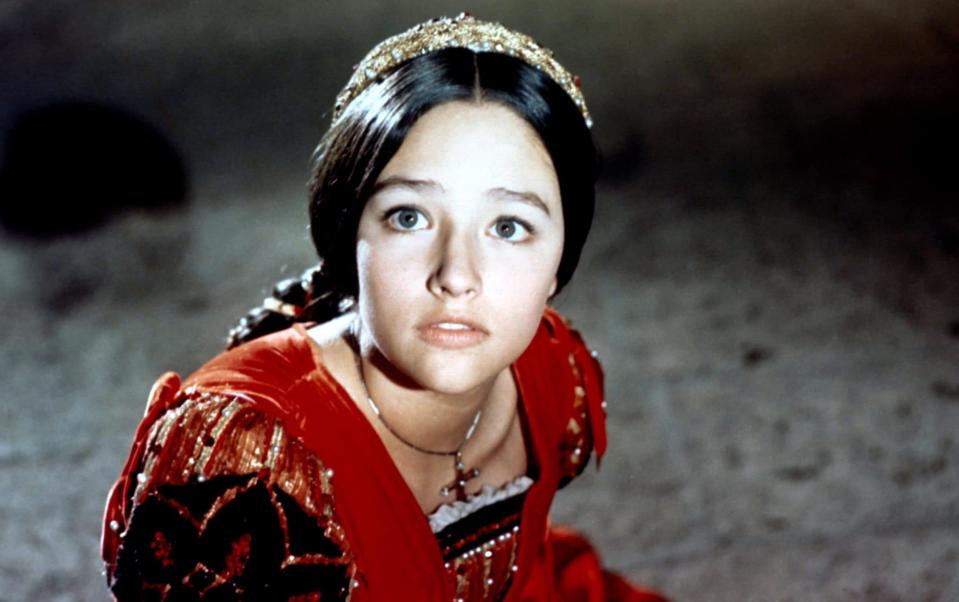Was Shakespeare really a woman? And does Taylor Swift know him best?

Unlike Shakespeare’s whining schoolboy, satchel on back, “creeping like snail / Unwillingly to school”, I positively strode in March to the opening of Taylor Swift’s Eras tour in Glendale, Arizona, eagerly anticipating her rendition of the perfect pop song, Love Story – “Little did I know / you were Romeo, you were throwin’ pebbles / And my daddy said, ‘Stay away from Juliet.’” At the climax of the song, Juliet’s dad relents, Romeo pulls out a ring, and the girl heads off to buy a wedding dress.
In this century’s crisis of adolescent mental health, Swift could hardly have been seen to be advocating double teenage suicide of the kind that ends the original play. As Sophie Duncan shows in Searching for Juliet (★★★★☆), her witty and scholarly history of the heroine’s “afterlife”, Swift joins a long line of creative artists in every conceivable form – not to mention advertisers, purveyors of tourist tat in Verona, and social-media influencers – who have repurposed the tragedy in which Shakespeare more or less invented the idea of the teenager in love. The story had been told before, but Shakespeare was the first to make Juliet so very young: just 13.
Duncan writes especially well about Franco Zeffirelli’s casting of 15-year-old Olivia Hussey in his 1968 film, for which the promotional material said: “The star-crossed lovers of Verona could also be the love children of Haight-Ashbury and the East Village.” Apparently Zeffirelli had hoped to cast Paul McCartney as Romeo. Though this didn’t work out, McCartney, always the gentleman, took Hussey for an evening at a nightclub and sent her a telegram saying, “You’re a beautiful Juliet.”
We can say with certainty that Juliet was originally a boy: Shakespeare wrote the part for an apprentice male actor. Not until 1662, Duncan reminds us, was there a female Juliet, the 35-year-old Mary Saunderson, who duly married the actor who played… Mercutio.
The proposition that Juliet’s creator was a woman is harder to sustain. Four years ago, the American journalist Elizabeth Winkler published an essay in The Atlantic suggesting that the true author of the plays was Emilia Lanier, née Bassano, daughter of a Venetian-born musician at the court of Queen Elizabeth I. She was an accomplished poet and the mistress of Lord Hunsdon, patron of Shakespeare’s acting company. In 1973, the Oxford don AL Rowse confidently, but without evidence, announced that she was the Dark Lady of Shakespeare’s sonnets; Winkler then out-Rowsed Rowse by elevating her into Shakespeare himself, despite the fact that Bassano’s most notable poem, a pious number titled Salve Deus Rex Judæorum, bears no resemblance to the works attributed to the man from Stratford, which form the bedrock of not religious but secular English literature.

Who, then, if not, Bassano? Mary Sidney, perhaps, sister of the unmatched courtier poet Sir Philip Sidney, and both a poet and patron of poets? Heck, why not say Queen Elizabeth herself? After all, the revolutionary Malcolm X believed that the plays were written by King James I. The Second Queen Elizabeth was characteristically tight-lipped on the Shakespeare Authorship Question, though we do know that her husband was an advocate of Sir Henry Neville – while her son has always been a staunch defender of the faith in the authentic “Will of all Wills, the Warwickshire Will,” as history’s leading Bardolater, the actor David Garrick, once called him.
In Shakespeare Was a Woman and Other Heresies (★★★☆☆), her entertaining survey of the history of the authorship debate, Winkler reports that “[then-]Prince Charles had written to Prof Jonathan Bate, asking for a list of arguments backing Shakespeare. Was the Prince of Wales plagued by a faltering faith? If he had doubts, it would not be wise to let on – not as President of the Royal Shakespeare Company and not, certainly, as he was approaching his throne.” I can assure Winkler that the request from His future Majesty came only out of a desire to win the argument with his father that was, it seems, a fixture every Christmas at Sandringham.
Leadership of a Shakespearean theatre company is not inherently an impediment to “anti-Stratfordian” beliefs. The best chapter in Winkler’s book recounts her interview with Sir Mark Rylance, as great a Shakespearean actor as there has ever been and the original artistic director of the reconstructed Globe Theatre. He describes his conversion to the Baconian theory on the grounds of his wonder at the philosophical depth of the plays: surely they were the product of a philosopher, not a mere grammar-school boy from the provinces.
Yet one might just as well say that the knowledge of military matters in the plays means they must have been written by a soldier: rival playwright Ben Jonson, perhaps, who did indeed serve in the Netherlands. Or there is the argument that the frequent Italian settings means that they were written by an Italian. Step forward, lexicographer John Florio, one of the candidates ignored by Winkler – though he would presumably have known that Venice has canals, something of which the author of The Merchant of Venice and Othello the Moor of Venice seems to have been ignorant.

Personally, I believe that allusions to the Cotswolds and detailed technical knowledge of glove-making, not to mention a scene in which a cheeky but clever schoolboy called Will is given a Latin lesson by a Welsh schoolmaster, suggest that the plays were written by a glover’s son from middle England who went to the local grammar school where there was a master of Welsh descent. Or, as Vladimir Nabokov put it, recanting his playful questioning of Stratfordian orthodoxy, “the fact that the Warwickshire fellow wrote the plays is most satisfactorily proved on the strength of an applejohn and a pale primrose.”
Winkler unravels a wealth of cryptograms, anagrams, canards and conspiracies of the kind beloved of “anti-Stratfordians”, but studiously ignores testimony from Shakespeare’s contemporaries – Jonson, Leonard Digges, William Camden, Sir George Buc and several more – in which the actor from beside the Avon is identified as the author of the plays. Nor does she address the compelling evidence for collaborative playwriting that is a stumbling-block to those who believe that Will was merely the front man for an aristocratic amateur such as Bacon or Edward de Vere, 17th Earl of Oxford. Did Shakespeare write all his own plays? Not entirely, since other writers, such as brothel-keeper George Wilkins and Francis Beaumont’s erstwhile writing partner John Fletcher, had a hand in some of them.
Like many a journalist, Winkler is sometimes cruel. She doorsteps the venerable Shakespeare scholar Stanley Wells – at the time of writing, 93 years old – then chides him for lapses of memory that would be excusable in someone half his age. But she is also incisive: an evocative account of a visit to Evelyn Waugh’s grandson Alexander, an arch-Oxfordian, ends with the revelation that his belief might have something to do with his descent, via his grandmother Laura Herbert, from the daughter of the 17th Earl himself. The unflappable Waugh retorts that he is also descended from Francis Bacon, Mary Sidney and Henry Neville – “So I’ve got a choice, OK?”
The Rylance chapter is the best because it is the least antagonistic. With the diplomatic cunning of the Thomas Cromwell whom he portrayed so memorably in Wolf Hall, Sir Mark conjures the image of an “authorship utopia where everyone existed harmoniously,” enabling us to see that “we’re all children of Shakespeare”. The ultimate explanation for the authorship controversy is that everyone – schoolboy, lover, soldier, justice, lean and slippered pantaloon, tyrant, aristocrat, woman, outsider – can find themselves in Shakespeare, and that this phenomenon leads those with an obsessive turn of mind to pin his identity to some particular aristocrat, woman, outsider or whoever. You can find Bacon, de Vere and Emilia Bassano in Shakespeare not because any of them actually wrote the plays, but because Shakespeare was, as Ben Jonson recognised, the “Soul of the Age”.
To order either of the books above, call 0844 871 1514 or visit Telegraph Books

 Yahoo Sports
Yahoo Sports 